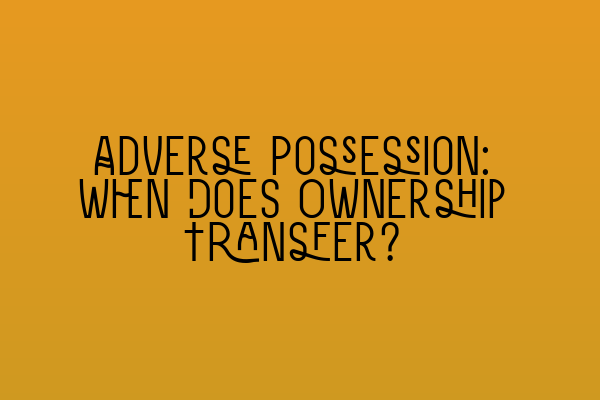Adverse Possession: When Does Ownership Transfer?
As a property solicitor at SQE Property Law & Land Law, I often encounter cases involving adverse possession, which is the legal principle that allows someone to claim ownership of land that they have occupied for an extended period of time. Adverse possession can be a complex issue, and it is important to understand the specific conditions and requirements that must be met in order for ownership to transfer. In this blog post, I will explain the concept of adverse possession, discuss the necessary elements for a successful claim, and provide some examples for better understanding.
Adverse possession refers to the situation where a person occupies another individual’s property without their permission, and after a certain period of time, they can make a claim to become the legal owner. The idea behind this legal principle is that if someone has been using and maintaining the land openly, continuously, and without interruption for a considerable period of time, it is unfair for the registered owner to assert their rights after neglecting the property for so long.
In order for adverse possession to be successful, several key elements must be satisfied. These include:
1. Actual possession: The claimant must physically possess the land in question. This means that they must physically occupy and control the property, using it as an owner would.
2. Exclusive possession: The claimant must possess the land exclusively, without sharing possession with the registered owner or anyone else. They must be able to demonstrate that they have full control over the property.
3. Open and notorious possession: The possession must be open and obvious to the registered owner and the general public. The claimant cannot hide or conceal their use of the land.
4. Adverse possession: The possession must be adverse to the interests of the registered owner. This means that the claimant must occupy the land without the owner’s permission or consent.
5. Continuous possession: The claimant must occupy the property continuously for a specified period of time, which varies depending on the jurisdiction. In England and Wales, the required period is 10 years for registered land, and 12 years for unregistered land.
It is worth noting that the length of possession required for adverse possession can vary depending on the circumstances. For example, if the claimant can establish that they have been in possession of the land for a shorter period but have made significant improvements or spent money on the property, the courts may be more inclined to grant their claim.
Now, let’s take a look at some examples to better understand how adverse possession works:
Example 1: Sarah has been using a small piece of land adjacent to her property as a garden for the past 15 years. The land belongs to her neighbor, but he has never objected to her use of it. Sarah can potentially claim adverse possession as she has been in continuous possession of the land, with the knowledge of the registered owner, for a period exceeding the required timeframe.
Example 2: Mark has been using an abandoned and neglected field for the past 20 years, regularly maintaining it and using it for grazing his animals. The field is not registered, and no one has asserted ownership or objected to Mark’s use of the land during this time. Mark may be able to claim adverse possession based on his continuous, exclusive, and open possession of the land over the required period.
It is important to remember that adverse possession can be a complex and contentious area of law, and each case is unique. If you believe you may have a claim for adverse possession, it is crucial to seek legal advice from a qualified property solicitor, who can guide you through the process and assess the merits of your claim.
In conclusion, adverse possession allows individuals who have occupied another person’s land for a substantial period to potentially become the legal owners. However, successful adverse possession claims require meeting certain criteria, including actual and exclusive possession, open and notorious possession, adverse use of the land, and continuous possession for a specified period. If you believe you have a claim for adverse possession, it is important to seek legal advice to navigate the complexities of this area. For further resources on property law and the SQE exams, check out SQE 1 Practice Exam Questions, SQE 1 Practice Mocks FLK1 FLK2, SQE 2 Preparation Courses, SQE 1 Preparation Courses, and SRA SQE Exam Dates.
Remember, understanding the complexities of adverse possession is essential for property owners and those seeking to make a claim. If you have any questions or require legal assistance with adverse possession or any other property law matter, don’t hesitate to contact SQE Property Law & Land Law for expert guidance and support.
